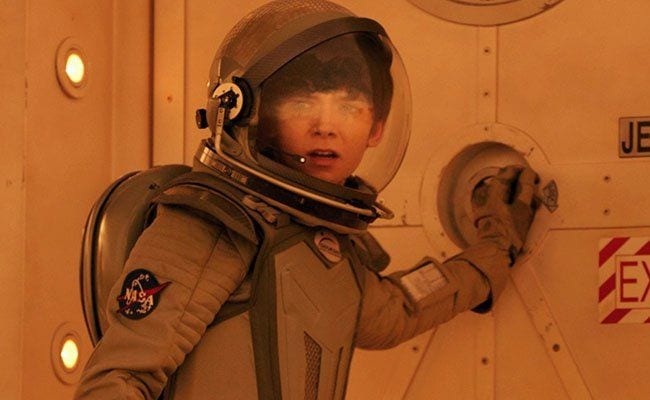
There’s almost enough kind-hearted sweetness to elevate the fluffy science-fictioner The Space Between Us above the usual Young Adult dreck. ‘Almost’ being the operative word to describe director Peter Chelsom’s love affair between a naïve Martian boy and a plucky Earth girl. It almost has interesting characters. It almost digs to deeper thematic levels. It almost provides the emotional catharsis it craves. Sadly, ‘almost’ is just enough to make this endurance test feel mildly tolerable between its tantalizing moments of inspiration.
“What’s your favorite thing about Earth?”
It’s a question that Earthlings don’t often contemplate. We take for granted the cleansing power of a rainstorm or the kaleidoscopic beauty of a sunset. These neglected details consume the imagination of Gardner Elliot (Asa Butterfield), a boy whose first 16 years have been spent living inside of a bubble on Mars. And you thought your adolescence was isolated!
Gardner is the ultimate ‘latchkey kid’. His mother Sarah (Janet Montgomery) was an astronaut in the Genesis Program that first colonized Mars. She died while giving birth to Gardner, a fact he has internalized with soul crushing precision. “I killed my mother,” he sincerely confesses to Tulsa (Britt Robertson), his social media buddy back on Earth.
Tulsa is also an orphan, abandoned by her parents and left to the auspices of one foster family after another. Her current father is a drunken crop duster who probably hangs out with Randy Quaid’s character from Independence Day on the weekends. Tulsa and Gardner dream of meeting one day, perhaps to have a cross-country adventure that involves lots of heartfelt talks and stolen vehicles. But more on that later
Several poorly developed supporting characters further complicate matters. There’s Nathaniel Shepherd (Gary Oldman), who founded the Genesis Program and made the fateful decision to hide Gardner’s existence for public relations purposes (? because we know how much Earthlings hate children ?). Kendra (Carla Gugino) is a foxy scientist lady who acts as Gardner’s surrogate mother on Mars, and BD Wong is the NASA bureaucrat who conveniently appears whenever Nathaniel needs to get angry about something.
The Space Between Us is one of those infuriating films in which all the turmoil could be avoided if people simply talked to one another. In this case, if someone would tell Gardner the identity of his biological father, we could avoid the entire movie. Unless you’re routinely baffled by Scooby Doo cartoon mysteries, the true identity of Gardner’s father will be painfully obvious, but we’re forced to endure Gardner’s two hour trudge to figure it out.
Chelsom (Hector and the Search for Happiness (2014), Shall We Dance (2004)) provides solid, unspectacular direction here. The action scenes are capably helmed, including a daring escape by Gardner and Tulsa via a propeller plane. The space launch sequences are seamless, and the Mars vista feels appropriately derivative of The Martian.
We are wholly independent, with no corporate backers.
Simply whitelisting PopMatters is a show of support.
Thank you.
The cast, too, is very good. Oldman contains his quacking rage for most of the affair, and is thoroughly convincing as a disheveled scientist who never recovered from his disastrous decision. The real star of the show, however, is Butterfield, who seems poised to make the transition from child actor to mainstream cinema. Butterfield is uncanny as the frail Gardner. His impossibly skinny frame is a blur of elbows and knees as he stomps across the screen. It’s unclear whether he’s walking, or if the Earth is rising suddenly to meet his feet. His comic timing is evident as he watches the approach of a galloping horse with the perfect mixture of childlike wonder and mind-freezing terror. Better days and much better films clearly lay ahead for Butterfield.
The real issues with The Space Between Us reside in Allan Loeb’s script, which fails to capitalize on a moderately interesting premise. Loeb creates an ever-curious force of positivity in Gardner, and then surrounds him with cynics and burnouts who have forgotten how to trust. It’s a wonderful strategy that fails in the execution. None of these secondary characters are rich enough to show any genuine change. Their moments of self-realization and catharsis, as a result, feel unconvincing. All of the emotional highlights — campfires in the desert and soulful conversations — exist in the appropriate places, but the lead-up is totally unsatisfying.
Gardner’s primary motivation of finding his father is to blame. Instead of a film that watches Gardner break down his father’s defenses as they get to know one another, we get pointless chase scenes interspersed with hilariously bad dialogue. “How can I be indispensable if no one knows I exist?” is a particular lowlight.
The chemistry between Gardner and Tulsa is believable, but you’re more concerned with the number of cars they are stealing than the progression of their love affair. Seriously, Nicolas Cage stole fewer cars in 2000’s Gone in Sixty Seconds than Tulsa lifts here.
The obviousness of the themes and metaphors also becomes tiresome. We establish the scientific truism, for instance, that Gardner’s bones and organs can’t tolerate Earth’s intense gravity. A special operation can reinforce his brittle bones, but his enlarged heart will never be suited for the rigors of this planet. Just in case the symbolism of a boy whose heart is too big for Earth eludes you, we get several heavy-handed reminders, including Tulsa explaining, “Your heart is too big for this world!”
That The Space Between Us doesn’t take itself quite as seriously as its Young Adult brethren is a testament to Butterfield’s uplifting presence. Like the others, however, it does little to justify its sweeping emotional crescendos. Ultimately, this is just a bad movie about a Martian and his girlfriend playing hide-and-seek from some space cops.

